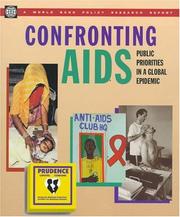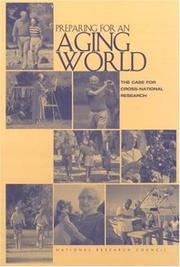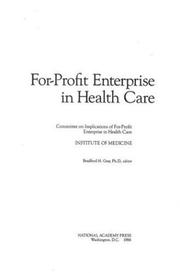| Listing 1 - 10 of 17 | << page >> |
Sort by
|

ISBN: 1853434442 9781853434440 9781853434433 1853434434 Year: 1999 Publisher: London Free Association Books
Abstract | Keywords | Export | Availability | Bookmark
 Loading...
Loading...Choose an application
- Reference Manager
- EndNote
- RefWorks (Direct export to RefWorks)
This work is now widely recognised as one of the founding texts in a new approach to analyzing the links between political power, expertise and the self. This "governmentality" perspective has had important implications for a range of academic disciplines including criminology, political theory, sociology and psychology and has generated much theoretical innovation and empirical investigation. This second edition adds a new introduction setting out the methodological and conceptual bases of this approach and a new final chapter that considers some of the implications of recent developments in the government of subjectivity.
Psychologie appliquée --- Contrôle (Psychologie) --- Contrôle social --- Politique gouvernemtale --- Zelf. --- Subjectiviteit. --- Psychologische aspecten. --- Politisering. --- Psychologie appliquée --- Contrôle (Psychologie) --- Contrôle social --- Social psychology --- Psychology, Applied --- Control (Psychology) --- Social control --- Families --- Psychology, Industrial --- Famille --- Psychologie du travail --- Social Control Policies --- Family --- History. --- Government policy --- History --- Psychological aspects --- Histoire. --- Politique gouvernementale --- Histoire --- Aspect psychologique --- history. --- psychology. --- Familles

ISBN: 1874719977 9781874719977 1909493678 1351280449 1351280430 9781909493674 9781351280433 1351280422 1351280414 9781351280419 9781351280440 Year: 2006 Publisher: Sheffield Greenleaf
Abstract | Keywords | Export | Availability | Bookmark
 Loading...
Loading...Choose an application
- Reference Manager
- EndNote
- RefWorks (Direct export to RefWorks)
"The project of science has been to provide answers to questions about the world and how it works. Often, this lofty role has been characterised by a narrow and dogmatic scientific training, an unwillingness to communicate to differing stakeholder needs, a refusal to accept and to manage uncertainty, complexity and value commitments, and the reduction of knowledge assessment to colleague peer review on narrowly technical issues. Times have changed. As the world faces increasingly disparate challenges, science is subjected to increasingly vehement demands from a society calling for transparency, openness and public participation in science policy. Science is going through an evolutionary process. Perhaps the most painful process it has ever encountered. Research on the interfaces between science and society is a burgeoning area. A new conception of knowledge now appears to be emerging, based on the awareness of complexity, uncertainty and a plurality of legitimate perspectives and interests. Democracy is extending into the previously quite exclusive scientific realm, and science must now submit to public scrutiny and participation in the governance of knowledge. This book provides much-needed reflections on the methods and tools for knowledge quality assurance, particularly on its inputs to extended policy and decision-making processes. The overall aim is to improve the relationship between science and society. The discussion involves six themes: communicating between plural perspectives; accepting and learning how to manage uncertainty, complexity and value commitments; acknowledging new conceptions of knowledge; implementing transparency, openness and participation in science policy; valuing community-based research; and exploring how new ICT can support inclusive governance. Taken together, these themes provide both a framework and vision on how to conceive, discuss and evaluate the changes that are occurring. The chapters cover theory, practice, approaches, experiences, ideas and suggestions for a move beyond "talking the talk" to "walking the walk". Science and policy interfaces are dynamic processes needing to permanently redefine themselves and their roles. This book contributes to the enrichment and deepening of our understanding of these important new trends in the social relations of science, which are fundamental to our understanding of the prospects for further progress. The book will be essential reading for scientists, policy-makers, managers and the public."--Provided by publisher.
Sociology of knowledge --- Mass media and technology. --- New products -- History. --- Science -- Public opinion. --- Science. --- Technological innovations -- Government policy -- Citizen participation. --- Technology -- Social aspects. --- Science --- Social Control Policies --- Computer Systems --- Natural Science Disciplines --- Public Relations --- Policy --- Disciplines and Occupations --- Social Control, Formal --- Organization and Administration --- Computing Methodologies --- Sociology --- Social Sciences --- Health Services Administration --- Information Science --- Health Care Economics and Organizations --- Anthropology, Education, Sociology and Social Phenomena --- Health Care --- Research --- Public Policy --- Community-Institutional Relations --- Computer Communication Networks --- Physical Sciences & Mathematics --- Sciences - General --- Social aspects --- Social aspects. --- Science and society --- Sociology of science

ISBN: 0195211170 Year: 1997 Publisher: Oxford Oxford University Press
Abstract | Keywords | Export | Availability | Bookmark
 Loading...
Loading...Choose an application
- Reference Manager
- EndNote
- RefWorks (Direct export to RefWorks)
Hygiene. Public health. Protection --- Infectious diseases. Communicable diseases --- Developing countries --- AIDS (Disease) --- Sida --- Prevention --- Government policy. --- Prévention --- Politique gouvernementale --- -616.97 --- 351.774 --- 614.44 --- Acquired immune deficiency syndrome --- Acquired immunodeficiency syndrome --- Acquired immunological deficiency syndrome --- HIV infections --- Immunological deficiency syndromes --- Virus-induced immunosuppression --- -Government policy --- International cooperation. --- Prévention --- 616.97 --- International cooperation --- Prevention&delete& --- Government policy --- Slow Virus Diseases --- Public Policy --- HIV Infections --- Social Control Policies --- Immunologic Deficiency Syndromes --- Sexually Transmitted Diseases, Viral --- Virus Diseases --- Lentivirus Infections --- Diseases --- Sexually Transmitted Diseases --- Policy --- Immune System Diseases --- Social Control, Formal --- Retroviridae Infections --- Social Sciences --- RNA Virus Infections --- Health Care Economics and Organizations --- Sociology --- Anthropology, Education, Sociology and Social Phenomena --- Health Care --- Health Policy --- Acquired Immunodeficiency Syndrome --- Public Health --- Health & Biological Sciences --- Communicable Diseases

ISBN: 0485115417 0485121476 Year: 1999 Publisher: London Athlone Press
Abstract | Keywords | Export | Availability | Bookmark
 Loading...
Loading...Choose an application
- Reference Manager
- EndNote
- RefWorks (Direct export to RefWorks)
This historical account of the care of insanity outside formal instruction explores key issues relating to the social history of madness from 1750 to the present day. These include women and the social construciton of madness, the boarding out of lunatics by poor law authorities, familial care and treatment of the insane and the practice of mental healing by general practitioners.
History of the United Kingdom and Ireland --- Psychiatry --- anno 1800-1999 --- anno 1700-1799 --- Mentally ill --- Community mental health services --- Psychiatric hospital care --- Mental health policy --- Malades mentaux --- Services communautaires de santé mentale --- Hôpitaux psychiatriques --- Santé mentale --- Care --- History --- Soins --- Histoire --- Politique gouvernementale --- Mental health policy -- Great Britain -- History. --- Mental health policy -- Ireland -- History. --- Psychiatric hospital care -- Great Britain -- History. --- Psychiatric hospital care -- Ireland -- History. --- Psychiatric hospitals -- Great Britain -- History. --- Psychiatric hospitals -- Ireland -- History. --- Hospitals, Special --- Behavioral Disciplines and Activities --- Public Policy --- Health Services --- Hospitals --- Social Control Policies --- Psychiatry and Psychology --- Health Care Facilities, Manpower, and Services --- Health Care --- Social Control, Formal --- Policy --- Health Facilities --- Sociology --- Health Care Economics and Organizations --- Social Sciences --- Anthropology, Education, Sociology and Social Phenomena --- Hospitals, Psychiatric --- Health Policy --- Mental Health Services --- Health & Biological Sciences --- Psychiatry - General --- Services communautaires de santé mentale --- Hôpitaux psychiatriques --- Santé mentale
Book
ISBN: 9789042025998 9789042026322 9042025999 9042026324 1282505181 9786612505188 9781282505186 6612505184 Year: 2009 Publisher: Amsterdam Rodopi
Abstract | Keywords | Export | Availability | Bookmark
 Loading...
Loading...Choose an application
- Reference Manager
- EndNote
- RefWorks (Direct export to RefWorks)
Visiting relatives and friends in medical institutions is a common practice in all corners of the world. People probably go into hospitals as a visitor more frequently than they do as a patient. Permeable Walls is the first book devoted to the history of hospital and asylum visiting and deflects attention from medical history’s more traditionally studied constituencies, patients and doctors. Covering the eighteenth to the late twentieth centuries, and taking case studies from around the globe, the authors demonstrate that hospitals and asylums could be remarkably permeable institutions. However, policies towards visitors have varied from outright exclusion, as in the case of some isolation hospitals in Victorian Britain, to near open access in the first Chinese missionary hospitals. Historical studies of visitors and visiting, as a result, tell us much about the changing relationship between healthcare institutions and the communities they serve. These histories are particularly relevant at a time when service providers seek ways to involve patients’ representatives in healthcare decision making; to control hospital super-bugs; and to make the hospital environment accessible yet safe and secure. With the re-emergence of restricted visiting, the subject remains one of the most emotive topics in the history of institutional medicine. Adopting a wide-ranging definition of visitors, from official inquirers to family members, Permeable Walls provides an innovative perspective on hospitals and asylums historically and will interest historians of medicine, charity and governance, as well as healthcare policy-makers.
Social policy --- Sociology of social welfare --- Hospitals, Psychiatric --- Health Policy --- History, 18th Century. --- History, 19th Century. --- History, 20th Century. --- Hospital-Patient Relations. --- Professional-Family Relations. --- Visitors to Patients --- Visiting the sick --- Hospitals --- Psychiatric hospitals --- Visites aux malades --- Hôpitaux --- Hôpitaux psychiatriques --- history. --- History. --- Histoire --- Hospital planning. --- Hospitals--Design and construction. --- Hospitals--Planning. --- History, Modern 1601 --- -Hospitals, Special --- Hospital Administration --- Public Policy --- Interpersonal Relations --- Persons --- Public Relations --- Social Control Policies --- History --- Named Groups --- Health Facilities --- Organization and Administration --- Psychology, Social --- Health Services Administration --- Social Control, Formal --- Humanities --- Health Care Facilities, Manpower, and Services --- Policy --- Behavior and Behavior Mechanisms --- Health Care --- Social Sciences --- Sociology --- Psychiatry and Psychology --- Health Care Economics and Organizations --- Anthropology, Education, Sociology and Social Phenomena --- History, 20th Century --- History, 19th Century --- Hospital-Patient Relations --- Professional-Family Relations --- History, 18th Century --- Medical policy --- Psychiatrische Klinik. --- Krankenbesuch. --- Krankenhaus. --- Geschichte 1700-2000. --- Hôpitaux --- Hôpitaux psychiatriques --- Insane asylums --- Mental hospitals --- Mental illness --- Mental institutions --- Mentally ill --- Psychiatry in general hospitals --- Benevolent institutions --- Infirmaries --- Psychiatric services --- Sick --- Volunteer workers in medical care --- Asylums --- Mental health facilities --- Specialty hospitals --- Health facilities --- Hospitals. --- Medical policy. --- Psychiatric hospitals. --- Visiting the sick. --- Insane --- Medical care --- Health care policy --- Health policy --- Medicine and state --- Policy, Medical --- Public health --- Public health policy --- State and medicine --- Science and state --- Government policy --- Law and legislation --- Political aspects
Book
ISBN: 9781409437949 9781409437956 1409437949 1409437957 1317098234 1315594706 1317098226 1283319063 9786613319067 9781315594705 9781317098218 9781317098225 9781138246379 Year: 2011 Publisher: Farnham Ashgate
Abstract | Keywords | Export | Availability | Bookmark
 Loading...
Loading...Choose an application
- Reference Manager
- EndNote
- RefWorks (Direct export to RefWorks)
Bridging the gap between histories of medicine and political/institutional histories of the early modern crown, this book explores the relationship between one of the most highly bureaucratic regimes in early modern Europe, Spain, and crown interest in and regulation of medical practices. Complementing recent histories that have emphasized the interdependent nature of governance between the crown and municipalities in sixteenth-century Spain, this study argues that medical policies were the result of negotiation and cooperation among the crown, the towns, and medical practitioners.
History of human medicine --- History of Spain --- anno 1500-1599 --- Public health --- Medical policy --- Medical personnel --- Public Health --- Health Personnel --- Health Policy --- History, 15th Century --- History --- Government policy --- history --- Philip --- Political and social views. --- Geschichte 1556-1598. --- Medical personnel -- Government policy -- Spain -- History -- 15th century. --- Medical policy -- Spain -- History -- 15th century. --- Philip II, King of Spain, 1527-1598 -- Political and social views. --- Public health -- Spain -- History -- 15th century. --- Public Policy --- Europe --- History, Early Modern 1451-1600 --- Environment and Public Health --- Health --- Medicine --- Humanities --- Health Care Facilities, Manpower, and Services --- Occupational Groups --- Health Care --- Health Occupations --- Persons --- Social Control Policies --- Population Characteristics --- Geographic Locations --- Social Control, Formal --- Geographicals --- Named Groups --- Disciplines and Occupations --- Policy --- Social Sciences --- Sociology --- Health Care Economics and Organizations --- Anthropology, Education, Sociology and Social Phenomena --- Spain --- Health & Biological Sciences --- World Health --- Community health --- Health services --- Hygiene, Public --- Hygiene, Social --- Public health services --- Public hygiene --- Sanitary affairs --- Social hygiene --- Human services --- Biosecurity --- Health literacy --- Medicine, Preventive --- National health services --- Sanitation --- Health care policy --- Health policy --- Medical care --- Medicine and state --- Policy, Medical --- Public health policy --- State and medicine --- Science and state --- Social policy --- Health care personnel --- Health care professionals --- Health manpower --- Health personnel --- Health professions --- Health sciences personnel --- Health services personnel --- Healthcare professionals --- Medical manpower --- Professional employees --- Filips --- Felipe --- Filipe --- Philippe --- Filippe --- Philips --- Fīlīb --- Philipp --- Filippo --- History, 15th Century. --- history. --- Spain.

ISBN: 0309074215 0309502810 9780309074216 9780309502818 0305074215 0309170877 9780309170871 Year: 2001 Publisher: Washington, D.C. National Academy Press
Abstract | Keywords | Export | Availability | Bookmark
 Loading...
Loading...Choose an application
- Reference Manager
- EndNote
- RefWorks (Direct export to RefWorks)
Age group sociology --- Income --- United States --- Aging --- Older people --- Vieillissement --- Personnes âgées --- Research --- Economic conditions --- Health and hygiene --- Recherche --- Conditions économiques --- Santé et hygiène --- AA / International- internationaal --- 368.43 --- 332.832 --- 658.324 --- 311.94 --- 368.42 --- Ouderdomsverzekering. Voorbarige dood. Weduwen en wezen. --- Pensioen. Brugpensioen. --- Pensioenen. Verzekeringen. --- Verdeling van de bevolking naar leeftijd. Veroudering van de bevolking. --- Ziekte- en invaliditeitsverzekering. Ziekenfondsen. --- Aging -- Research. --- Older people -- Economic conditions. --- Older people -- Health and hygiene. --- Public Policy --- Research Design --- Population Dynamics --- Health Planning --- Health Care Economics and Organizations --- Demography --- Methods --- Legislation as Topic --- Social Control Policies --- Growth and Development --- Science --- Policy --- Physiological Processes --- Social Control, Formal --- Social Sciences --- Epidemiologic Measurements --- Health Care --- Population Characteristics --- Investigative Techniques --- Natural Science Disciplines --- Analytical, Diagnostic and Therapeutic Techniques and Equipment --- Public Health --- Anthropology, Education, Sociology and Social Phenomena --- Physiological Phenomena --- Sociology --- Disciplines and Occupations --- Environment and Public Health --- Phenomena and Processes --- Gerontology --- Social Welfare & Social Work --- Research. --- Economic conditions. --- Health and hygiene. --- Personnes âgées --- Conditions économiques --- Santé et hygiène --- Age --- Ageing --- Senescence --- Physiological effect --- Geriatrics --- Developmental biology --- Longevity --- Age factors in disease --- Verdeling van de bevolking naar leeftijd. Veroudering van de bevolking --- Pensioen. Brugpensioen --- Ziekte- en invaliditeitsverzekering. Ziekenfondsen --- Ouderdomsverzekering. Voorbarige dood. Weduwen en wezen --- Pensioenen. Verzekeringen --- United States of America

ISBN: 0309036437 9786610221660 1280221666 0309557631 0585144117 9780585144115 9780309036436 0309078636 9780309078634 9781280221668 6610221669 9780309557634 Year: 1986 Publisher: Washington, D.C. National Academy Press
Abstract | Keywords | Export | Availability | Bookmark
 Loading...
Loading...Choose an application
- Reference Manager
- EndNote
- RefWorks (Direct export to RefWorks)
Business policy --- Service industry --- United States --- Electronic books. -- local. --- Health facilities, Proprietary. --- Medical corporations. --- Medical economics. --- Medical economics --- Health facilities, Proprietary --- Medical corporations --- Science --- Social Control Policies --- Health Care Economics and Organizations --- Occupational Groups --- Ethics --- Social Problems --- Social Sciences --- Technology, Industry, and Agriculture --- Medical Assistance --- Insurance, Health --- Socioeconomic Factors --- Residential Facilities --- Patient Care Management --- Education, Professional --- Health Care Evaluation Mechanisms --- Sociology --- Epidemiologic Methods --- Legislation as Topic --- Mathematics --- Health Care Facilities, Manpower, and Services --- Health Care Quality, Access, and Evaluation --- Morals --- North America --- Social Behavior --- Population Characteristics --- Natural Science Disciplines --- Humanities --- Public Assistance --- Policy --- Quality of Health Care --- Social Control, Formal --- Technology, Industry, Agriculture --- Health Care --- Anthropology, Education, Sociology and Social Phenomena --- Americas --- Health Services Administration --- Persons --- Behavior --- Education --- Public Health --- Investigative Techniques --- Insurance --- Analytical, Diagnostic and Therapeutic Techniques and Equipment --- Geographic Locations --- Environment and Public Health --- Disciplines and Occupations --- Philosophy --- Financing, Organized --- Named Groups --- Behavior and Behavior Mechanisms --- Financing, Government --- Geographicals --- Psychiatry and Psychology --- Medicare --- Health Facilities, Proprietary --- Health Personnel --- Delivery of Health Care --- Hospitals --- Nursing Homes --- Poverty --- Public Policy --- Social Responsibility --- Social Change --- Conflict of Interest --- Physicians --- Moral Obligations --- Biomedical Research --- Economics --- Education, Medical --- Statistics as Topic --- Research --- Ethics, Institutional --- Organizational Policy --- Social Dominance --- Industry --- Health Facilities --- Health & Biological Sciences --- Medical Economics --- Corporate medical practice --- Corporate practice of medicine --- For profit health facilities --- Health facilities, Investor-owned --- Health facilities, Private for profit --- Investor-owned health facilities --- Private for profit health facilities --- Proprietary health facilities --- Economics, Medical --- Health --- Health economics --- Hygiene --- Medical care --- Medicine --- Economic aspects --- Group medical practice --- Professional corporations --- United States of America

ISBN: 1402022506 1402022514 9781402022500 9781402022517 Year: 2004 Volume: v. 20 Publisher: Dordrecht Kluwer Academic Publishers
Abstract | Keywords | Export | Availability | Bookmark
 Loading...
Loading...Choose an application
- Reference Manager
- EndNote
- RefWorks (Direct export to RefWorks)
The Dutch experience has influenced the debate on euthanasia and death with dignity around the globe, especially with regard to whether physician-assisted suicide and euthanasia should be legitimized or legalized. A review of the literature reveals complex and often contradictory views about the Dutch experience. Some claim that the Netherlands offers a model for the world to follow; others believe that the Netherlands represents danger, rather than promise, and that the Dutch experience is the definitive answer regarding why we should not make active euthanasia and physician-assisted suicide part of our lives. Given these contradictory views, it has become clear that fieldwork is essential to developing a more informed opinion. Having investigated the Dutch experience for a number of years, and after thoroughly reading the vast literature published in English, I went to the Netherlands for one month in the summer of 1999 to get a feel for the local situation. I felt that this would provide the basis on which I could better interpret the findings of the available literature. I visited the major centers of medical ethics, as well as some research hospitals, and spoke with leading figures in the euthanasia policy and practice. The time spent was extremely beneficial and enriching. I followed in the footsteps of Carlos Gomez, who 1 published a book following one month of extensive research in the Netherlands.
Medical law --- Professional ethics. Deontology --- Netherlands --- Euthanasia --- Public Opinion --- Euthanasie --- legislation & jurisprudence --- ethics --- Law and legislation --- Public opinion. --- Droit --- Coercion --- Suicide, Assisted --- Wedge Argument --- Cross-Cultural Comparison --- Euthanasia, Active --- Empirical Research --- Attitude of Health Personnel --- Palliative Care --- Public Policy --- Social Change --- Advisory Committees --- Guideline Adherence --- Internationality --- Physician's Role --- Health Care Evaluation Mechanisms --- Social Control, Informal --- Quality of Health Care --- Patient Care --- Homicide --- Culture --- Policy Making --- Delivery of Health Care --- Professional Role --- Suicide --- Social Sciences --- Ethical Analysis --- Social Control Policies --- Social Control, Formal --- Terminal Care --- Research --- Socioeconomic Factors --- Sociology --- Attitude --- Health Care Quality, Access, and Evaluation --- Science --- Behavior and Behavior Mechanisms --- Policy --- Therapeutics --- Ethics --- Self-Injurious Behavior --- Role --- Social Problems --- Health Services Administration --- Anthropology, Cultural --- Health Services --- Anthropology, Education, Sociology and Social Phenomena --- Population Characteristics --- Natural Science Disciplines --- Health Care Facilities, Manpower, and Services --- Health Care Economics and Organizations --- Group Processes --- Anthropology --- Health Care --- Analytical, Diagnostic and Therapeutic Techniques and Equipment --- Behavioral Symptoms --- Humanities --- Psychiatry and Psychology --- Philosophy --- Behavior --- Disciplines and Occupations --- Psychology, Social --- Law - Europe, except U.K. --- Law - Non-U.S. --- Law, Politics & Government --- Public opinion --- Public. --- Philosophy. --- Ethics. --- Occupational medicine. --- Medical ethics. --- Medical laws and legislation. --- Theory of Medicine/Bioethics. --- Medical Law. --- Occupational Medicine/Industrial Medicine. --- Public health laws. --- Medicine, Industrial. --- Industrial medicine --- Medicine, Occupational --- Occupational medicine --- Medicine --- Occupational diseases --- Law, Medical --- Medical personnel --- Medical registration and examination --- Physicians --- Surgeons --- Medical policy --- Medical jurisprudence --- Biomedical ethics --- Clinical ethics --- Ethics, Medical --- Health care ethics --- Medical care --- Bioethics --- Professional ethics --- Nursing ethics --- Social medicine --- Deontology --- Ethics, Primitive --- Ethology --- Moral philosophy --- Morality --- Morals --- Philosophy, Moral --- Science, Moral --- Values --- Legal status, laws, etc. --- Moral and ethical aspects

ISBN: 0792351851 9780792351856 079235186X 9780792351863 9786610043262 1280043261 0306468638 Year: 1998 Publisher: Dordrecht Kluwer Academic
Abstract | Keywords | Export | Availability | Bookmark
 Loading...
Loading...Choose an application
- Reference Manager
- EndNote
- RefWorks (Direct export to RefWorks)
claim was that he had faced a conflict of duties pitting his legal duty not to kill against his duty as a physician to relieve his patient’s unbearable suffering. He was acquitted on the important grounds of conflict of duty. These grounds are based on a concept in Dutch law called "force majeure" 4 which recognizes extenuating circumstances such as conflicts of duty. The acquittal was upheld by the Lower Court of Alkmaar, but revoked by an Amsterdam court of appeal. The case went on to the Supreme Court, but before the Supreme Court's decision was issued, the Royal Dutch Medical Association (RDMA) attempted to clarify the criteria for euthanasia that many within the profession already accepted. The RDMA proposed that physicians be permitted to perform euthanasia provided that a set of procedures had been met. Variously stated, the guidelines contain the following central provisions: Voluntary, competent, explicit, and persistent requests on the part of the • patient; Requests based on full information; • The patient is in a situation of intolerable and hopeless suffering (either • physical or mental); No further acceptable alternatives to euthanasia. All alternatives • acceptable to the patient for relief of suffering having been tried; Consultation with at least one other physician whose judgment can be • 5 expected to be independent. Indirectly, these guidelines became the criteria prosecutors used to decide whether or not to bring charges.
Medical law --- Professional ethics. Deontology --- Netherlands --- Euthanasia --- Right to die --- Euthanasie --- Droit à la mort --- -#GBIB:CBMER --- 179.7 <492> --- 343.61 <492> --- Assisted death (Euthanasia) --- Assisted dying (Euthanasia) --- Death, Assisted (Euthanasia) --- Death, Mercy --- Dying, Assisted (Euthanasia) --- Killing, Mercy --- Mercy death --- Mercy killing --- Homicide --- Medical ethics --- Assisted suicide --- Ethics. --- Euthanasia - Netherlands. --- Medical ethics. --- Medicine. --- Suicide --- Health Care Quality, Access, and Evaluation --- Persons --- Philosophy --- Mandatory Programs --- Medicine --- Behavior and Behavior Mechanisms --- Health Personnel --- Behavioral Symptoms --- Crime --- Weights and Measures --- Terminal Care --- Religion --- Hospitals, Special --- Social Control Policies --- Ethics, Clinical --- Mental Processes --- Patient Care --- Behavioral Sciences --- Morals --- Humanities --- Social Problems --- Social Control, Formal --- Chemicals and Drugs --- Emotional Intelligence --- Psychophysiology --- Psychological Phenomena and Processes --- Health Facilities --- Policy Making --- Organizations --- Disclosure --- Social Sciences --- Withholding Treatment --- Criminology --- Community Health Services --- Social Control, Informal --- Patient Rights --- Education, Professional --- Science --- Professional Practice --- Health Care --- Sociology --- Health Services --- Organization and Administration --- Natural Science Disciplines --- Health Care Facilities, Manpower, and Services --- Policy --- Ethics, Professional --- Education --- Investigative Techniques --- Named Groups --- Occupational Groups --- Therapeutics --- Health Care Economics and Organizations --- Behavior --- Health Occupations --- Communication --- Self-Injurious Behavior --- Anthropology, Education, Sociology and Social Phenomena --- Human Rights --- Intelligence --- Psychiatry and Psychology --- Psychology, Social --- Behavioral Disciplines and Activities --- Health Services Administration --- Disciplines and Occupations --- Analytical, Diagnostic and Therapeutic Techniques and Equipment --- Personality --- Christianity --- Euthanasia, Active, Voluntary --- Intention --- Mental Competency --- Suicide, Assisted --- Wedge Argument --- Ethics --- Euthanasia, Active --- Euthanasia, Passive --- Mandatory Reporting --- Motivation --- Organizational Policy --- Public Policy --- Criminal Law --- Ethics, Medical --- Hospices --- Psychiatry --- Social Responsibility --- Advisory Committees --- Ethical Analysis --- Patients --- Physicians --- Stress, Psychological --- Informed Consent --- Palliative Care --- Education, Continuing --- Hospitals --- Empirical Research --- Legislation as Topic --- Internationality --- Pharmaceutical Preparations --- Societies --- Judicial Role --- Referral and Consultation --- Double Effect Principle --- International Cooperation --- Jurisprudence --- Research --- Public Opinion --- Reference Standards --- Biology --- Health & Biological Sciences --- Biology - General --- Medical Ethics & Philosophy --- Droit à la mort --- EPUB-LIV-FT SPRINGER-B --- Political science. --- Public health. --- Medicine & Public Health. --- Theory of Medicine/Bioethics. --- Public Health. --- Political Science. --- #GBIB:CBMER --- Administration --- Civil government --- Commonwealth, The --- Government --- Political theory --- Political thought --- Politics --- Science, Political --- Social sciences --- State, The --- Deontology --- Ethics, Primitive --- Ethology --- Moral philosophy --- Morality --- Philosophy, Moral --- Science, Moral --- Values --- Community health --- Health services --- Hygiene, Public --- Hygiene, Social --- Public health services --- Public hygiene --- Social hygiene --- Health --- Human services --- Biosecurity --- Health literacy --- Medicine, Preventive --- National health services --- Sanitation --- Biomedical ethics --- Clinical ethics --- Health care ethics --- Medical care --- Bioethics --- Professional ethics --- Nursing ethics --- Social medicine --- Moral and ethical aspects --- Euthanasia - Netherlands --- Euthanasie - Pays-Bas
| Listing 1 - 10 of 17 | << page >> |
Sort by
|

 Search
Search Feedback
Feedback About UniCat
About UniCat  Help
Help News
News